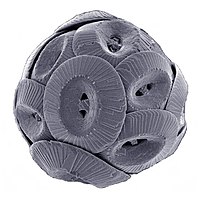
Photo from wikipedia
Ureolytic microbial-induced calcium carbonate precipitation (MICP) is a promising green technique for addressing sustainable building concerns by promoting self-healing mortar development. This paper deals with bacteria-based self-healing mortar under artificial… Click to show full abstract
Ureolytic microbial-induced calcium carbonate precipitation (MICP) is a promising green technique for addressing sustainable building concerns by promoting self-healing mortar development. This paper deals with bacteria-based self-healing mortar under artificial seawater incubation for the sake of fast crack sealing with sufficient calcium resource supply. The ureolytic MICP mechanism was explored by morphology characterization and compositional analysis. With polyvinyl alcohol fiber reinforcement, self-healing mortar beams were produced and bent to generate 0.4 mm width cracks at the bottom. The crack-sealing capacity was evaluated at an age of 7 days, 14 days, and 28 days, suggesting a 1-week and 2-week healing time for 7-day- and 14-day-old samples. However, the 28-day-old ones failed to heal the cracks completely. The precipitation crystals filling the crack gap were identified as mainly vaterite with cell imprints. Moreover, fiber surface was found to be adhered by bacterial precipitates indicating fiber–matrix interfacial bond repair.
Journal Title: Sustainability
Year Published: 2021
Link to full text (if available)
Share on Social Media: Sign Up to like & get
recommendations!